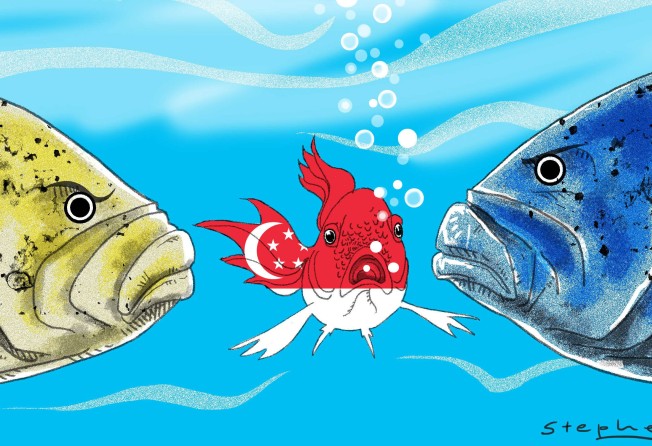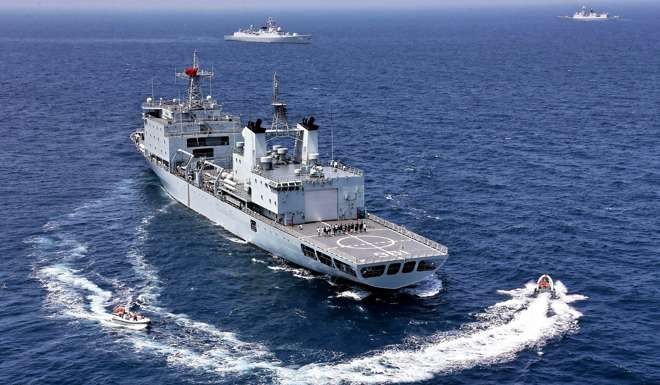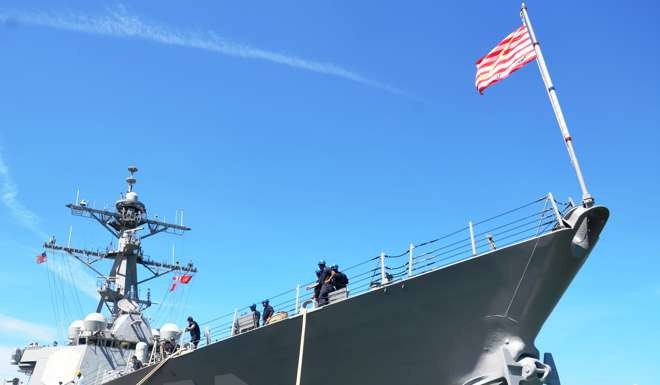
Raising concerns about the South China Sea does not make Singapore, or other Asian nations, anti-China
Tim J. Huxley and Alexander Neill say the issue is on their agenda because leaders have a huge and legitimate stake in regional security, and China’s militarisation of regional waters is not helping

Since last month, Singapore – a long-established friend of China – has surprisingly found itself in Beijing’s cross hairs. The city state has faced criticism in the Chinese state media over its alleged attempt to table a South China Sea-related item at the 17th Non-Aligned Movement summit in Venezuela, and also regarding its close defence relations with the United States. The annual Asia Security Summit, the Shangri-La Dialogue, organised in Singapore by our organisation, has also been in the firing line.
On October 1, this newspaper reported Major General Jin Yinan (金一南), a professor at the PLA’s National Defence University, as saying that China should take retaliatory measures against Singapore for its role in internationalising the South China Sea dispute. He also accused Singapore of stirring up US-China tension, and questioned Singapore’s motives in hosting the Shangri-La Dialogue.
General Jin’s harsh comments were reported in the immediate wake of a highly public spat between Singapore’s ambassador to China and the editor of the hardline Communist Party tabloid, the Global Times, over Singapore’s role at the Venezuela summit, where it supported efforts to include in the leaders’ joint statement a reference to the common position of members of the Association of Southeast Asian Nations on the South China Sea.

In the months before the international Permanent Court of Arbitration released a judgement in July which comprehensively rejected China’s expansive territorial claims in the South China Sea, Beijing’s propaganda machinery went into overdrive in an effort to pre-emptively discredit the ruling, which it correctly anticipated would have negative implications for China. Concurrently, key figures from China’s strategic community promulgated China’s own narrative for its claim to the sea and its features, which has been described by officials as one of China’s “core interests”.
In the wake of the court’s ruling, hardliners in Beijing are now evidently redoubling their efforts to undermine any common diplomatic position among Southeast Asian states which might further complicate China’s ambitions to dominate regional waters. Since 2012, this policy has already blighted efforts within Asean to project a united Southeast Asian response. China is now apparently taking the contest into non-Asean arenas, and seems willing to use bullying tactics against Southeast Asian countries that choose to withstand its pressure.
General Jin, who was a middle-ranking member of the PLA delegations to the Shangri-La Dialogue in 2015 and 2016, appears in his comments to reflect concerns in Beijing that Singapore’s government and the International Institute for Strategic Studies have intentionally highlighted the South China Sea dispute at the Shangri-La Dialogue.

The reality, though, is that the institute has worked hard for many years to liaise closely with the People’s Liberation Army in advance of the annual dialogue. The South China Sea has figured prominently in the dialogue in its past several annual iterations not because of any intent to embarrass China, but because it has become a vital security concern of numerous countries that participate, including the US, Japan and Australia as well as most Asean members. Over the past five years, many countries with important interests in the Asia-Pacific region’s security have come to see the South China Sea as a dangerous potential “flashpoint”, alongside the Taiwan Strait, the East China Sea and the Korean peninsula. Despite their usually restrained approach to the topic, these countries are only too conscious that China’s actions in the South China Sea have contributed substantially to the increased tensions there.
Regional countries are only too conscious that China’s actions in the South China Sea have contributed substantially to increased tensions
Several new naval and air bases will soon be operational on Chinese-occupied features in the South China Sea, as is a sophisticated command and control network and what appears to be an extensive air defence system. The PLA is deploying its most advanced ships and submarines into the region. Moreover, its maritime security forces and their auxiliaries are already interfering with the activities of other claimant countries’ fishing fleets.
Meanwhile, the US “rebalance to the Asia-Pacific” has continued, despite the setback posed by the stalling of progress on the Trans-Pacific Partnership trade deal and the imminent end of the Obama administration. The US is trying to ensure not just that America remains the pre-eminent power in the region, but also the continuance of a regional order that has brought security and prosperity to the Asia-Pacific over the past 40 years. A key element of this regional order has been freedom of navigation and overflight, and US naval and air patrols have been intended to uphold this freedom in the face of China’s militarisation of regional waters.

On September 30, US Defence Secretary Ashton Carter launched an informal summit for Asean countries’ defence ministers in Hawaii to discuss regional security challenges and on October 2, a US navy destroyer made a historic port call to the Vietnamese naval base at Cam Ranh Bay, the first since the end of the Vietnam war. Carter has pledged to sharpen the US “military edge” to the rebalance policy, indicating that the latest submarines and unmanned underwater vehicles will be deployed in the region.
As for Singapore, this is not the first time that its principled foreign policy has required it to stand up to pressure from larger countries. In the past, it has withstood various forms of pressure from not only China, but also Indonesia, Malaysia and even on occasion the US. As a potentially vulnerable small state, it would be dangerous for Singapore to accept that any other country has the right to act as its “big brother”.
Singapore has made it clear that standing up for its principled position on the South China Sea does not, in this case, equate with taking sides between the US and China, a point underlined by Singapore leaders’ fulsome congratulations to their Chinese counterparts on the 67th anniversary of the People’s Republic late last month and, more importantly, by the breadth and depth of economic and other cooperation that continues between Asia’s most powerful country and one of its smallest states.
Dr Tim J. Huxley is executive director, and Alexander Neill is a Shangri-La Dialogue senior fellow, at the International Institute for Strategic Studies, Asia